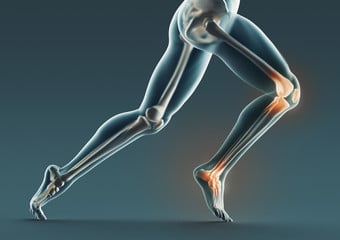The bones are a crucial part of our bodies as they perform essential tasks in our everyday lives.
The function of bones cannot be overemphasized because not only are they involved in locomotion, and storing essential nutrients, but they also help in protecting internal organs.
The bone is a living, growing tissues made up mostly of collagen, and calcium.
Collagen is a protein that provides a the soft framework, while calcium phosphate is the mineral that adds strength and hardens the body’s framework.
The combination of collagen and calcium, gives the bones flexibility and strength.
As such we need to be strong and healthy to prevent breakage (fracture). The density and size of the bones are usually genetic, but other factors such as nutrition, regular exercise, etc. can play a vital role in maintaining good bone health.
In this article you will learn the vital health tips for strong bones.
Health tips for Strong Bones

1. Consume calcium-rich foods
Calcium is a major building block for the bone tissue. It is an essential mineral needed for bone and teeth formation in growing children.
In adults, the bones absorb calcium to make it stronger, and in situations when there is a deficiency, it releases calcium to other parts of the body where they are needed (i.e., acting as a store), making it become weak and brittle thereby increasing the chances of fractures.
Deficiency can also increase the risk of bone diseases like osteoporosis, which is also characterized by weak bones and has no symptom until the bone breaks.
The Required Daily Intake (RDI) for calcium is 1,000 mg per day for an average adult, although growing teenagers need 1,300 mg and older women require 1,200 mg per day. [1]
Food rich in calcium includes tofu, beans/legumes, tiger nuts, bread, broccoli, sardines/salmon, soy milk, dairy products (milk, yogurt, etc.), shrimp.
2. Getting enough vitamin D to keep the bones healthy
Vitamin D is also an essential element when speaking of bone health as it helps the body with the absorption of calcium and phosphate for the formation of strong bones.
It helps the body to maintain the calcium, magnesium, and phosphorus levels in the blood.
The main natural source of vitamin D is from the synthesis in the layer under the skin through a chemical reaction that is sunlight dependent (UV radiation).
Other sources such as mushrooms exposed to UV light and fatty fish flesh can contribute to the vitamin in trace amounts.
Few food sources contain vitamin D, and hence it is usually substituted with supplements.
Deficiency of Vitamin D leads to lower absorption in calcium and results in rickets in children or osteomalacia or osteoporosis in adults. You should also get enough vitamin K, as it helps with stronger bones. [2]
3. Consume lots of fruits and green leafy vegetables
Green vegetables and fruits can also provide the body with minerals and vitamins that the body needs to build and maintain the bones.
Minerals and vitamins like magnesium, potassium, vitamin C, and vitamin K (which helps the body to generate proteins used in bone-building), etc. also aid in the absorption of calcium and neutralization of metabolic acids that could be harmful to the bones. [3]
They include asparagus, broccoli, green beans, okra, spinach, lettuce, bitter leaf and tomatoes.
4. Getting enough of other trace nutrients
Trace nutrients are not required in large amounts but still play essential roles in bone health, and so should be taken inadequately.
Some major trace nutrients for bone health are magnesium, zinc (stabilizes protein receptors for vitamin D and for protein synthesis), vitamin A, vitamin C, vitamin B12, iodine, etc.
Food sources to help include pork, mangoes, whole grain, fish, beef liver, eggs, seeds, etc. [4]
5. Enough physical exercises
Exercises are one of the most important ways of strengthening the bones. As a living tissue that it is, the bone responds to exercises by becoming stronger. There are many types of exercises, but the best for strong bones include weight-bearing exercises and resistance exercises.
Studies in older people who performed strength-training exercise showed that they had increases in bone mineral density, strength and size. [5]
Weight-bearing exercises are done against gravity and include jogging, walking, hiking, climbing stairs, jumping rope, dancing, playing tennis or football, etc.
Resistance exercises involve adding resistance to movement to make the muscles work hard, and they include using body weights, e.g., push up and pull up, using free weights or using weight machines. This is very important among these health tips for strong bones.
6. Reduction of caffeine and alcohol intake
Although it is yet to be fully understood, some studies have shown that excessive caffeine in-take has a direct negative effect on bone mass and density, which could lead to the bone disorder, especially in women. Also, chronic heavy drinking, particularly in young adults and adolescence, might affect the health of the bones drastically and increase the chances of causing osteoporosis later in life. It is known to trigger hormonal levels (especially in women), interferes with the balance of calcium, and the production of vitamin D.
It is therefore advised to reduce the consumption of both caffeine and alcohol for stronger and healthier bones.
7. Stop prolonged use of some medications.
Prolonged usage of certain medications or drugs can affect the metabolism of the bones, decrease bone formation, and cause bone loss. These drugs include heparin, glucocorticoids, cyclosporine, warfarin, thyroid hormones, cancer drugs, etc. [6]
8. Quitting smoking
Some studies have shown that smoking reduces the supply of blood to the bones and other body tissues. It also affects the balance of hormones in the body, slow bone-producing cell production, and decreases the rate of absorption of calcium in the body.
Smoking increases the chances of osteoporosis, and complete abstinence is advised.
Other Health Tips for Strong Bones:
- Take collagen supplements
- Avoid low-calorie foods
- Maintain healthy weight
- Eat foods High in Omega-3 Fats
Bottom Line
Your bones are very important to your body, and play a vital role in your daily activities. If you fail to take care your bones you can get diseases like osteoporosis, osteoarthritis, paget’s disease and rheumatoid arthritis. By following these health tips for strong bones above you can keep your bones healthy and bolstered.
Collins Nwokolo is a human physiologist, writer and health enthusiast. He loves writing helpful articles on health and fitness, which he enjoys sharing with everyone.







